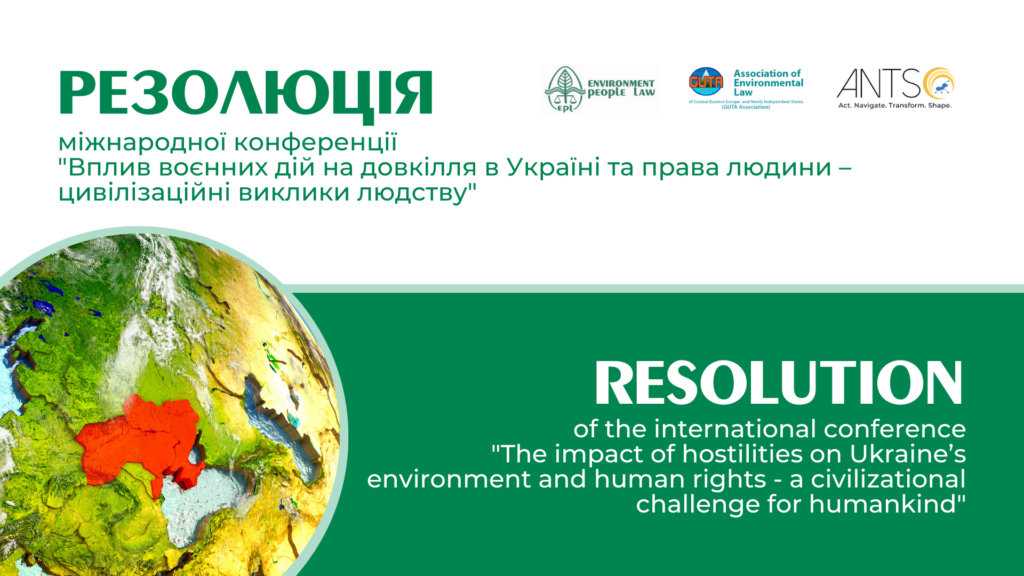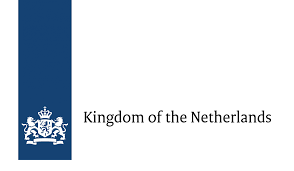Lviv region, Ukraine
A clean, healthy and sustainable environment is the prerequisite of a healthy next generation of Ukrainians. However, the environment, the silent victim of the war in Ukraine, needs the advocacy and guardianship of the national and international community in order to ensure such a future. A clean, healthy and sustainable environment is also necessary for a clean water and food supply, and for global food security. It is a human right for all.
The scope of environmental damage resulting from the conflict is widespread, long-term and severe. But the ongoing military actions are preventing state bodies from aggregating, assessing and documenting its impacts for cases of potential environmental crimes.
As with the successful Marshall Plan after World War II, it is important to lay down the foundation of the Ukrainian post-war recovery plan well in advance. This plan has to build back better. When the energy infrastructure is rebuilt, it should be fueled by renewables; when forests are restored, they should be protected from unsustainable logging; when homes are rebuilt, they should meet high energy-efficiency standards. Ukraine’s future should be as green as possible.
Many countries have already committed to contributing to the recovery of Ukraine. However, full responsibility for the damage must lie with the Russian Federation. Hitherto, the international community has rightfully focused on increasing sanctions. Now is the time to begin establishing targeted accountability mechanisms.
The circumstance of long-term Russian aggression, which violates the UN Charter, the Rome Statute and many other multilateral agreements and conventions, challenges us to reevaluate the current international framework for environmental protection and global security. It highlights the need for urgent deliberation and reassessment of the potency of the current regime of state sanctions for the repudiation of international law; it also necessitates the introduction of appropriate mechanisms to facilitate reparations to victim states. This will have a deterrent effect on all state leaders and safeguard human rights and the environment for future generations.
In light of the above, the participants of the international conference urge the government and the parliament of Ukraine to:
Pay special attention to the detection, assessment and collection of evidence of harm done to the environment during the Russian aggression;
Ratify the Rome Statute of the International Criminal Court, and support an amendment of the Rome Statute to include the crime of ecocide, which would put an end to impunity for the most serious environmental crimes during both war and peace time;
Amend the Criminal Code of Ukraine so that ecocide is defined in line with the Independent Expert Group Definition published in 2021, facilitating prosecution;
Actively use the courts of national jurisdiction and prosecutors network to investigate and prosecute the Russian military for environmental crimes, including the crime of ecocide;
Apply to the international courts and bodies of compliance for reparations, and pursue Russian accountability for damage to the environment and destruction of ecosystems;
Facilitate the application of multilateral agreements where Ukraine is a party, with the aim of holding Russia accountable for violations of such MEAs within compliance and dispute resolution mechanisms apply under such agreements;
Adopt and enforce EU provisions on the protection, preservation and conservation of the environment and establish new protected areas in Ukraine, including areas mined or polluted during the hostile actions;
- Continue and intensify the monitoring and assessment of the impact inflicted by the on-going and the still to be expected hostilities on its environment. It is recommended to frame the acquired data and information in terms of the so-called ecosystem approach as promoted by the International Union for the Conservation of Nature (IUCN) – https://www.iucn.org/our-union/commissions/commissions-ecosystem-management – so as to see how the impact is affecting the survival and well-being of the population of Ukraine and its biophysical environment in a coherent way;
- The monitoring and assessment have to be done with the most advanced scientific methodology and technology as available at institutions such as the United Nations Environment Programme, the European Environmental Agency, the secretariats of the Intergovernmental Panel on Climate Change (IPCC) and the Intergovernmental Science-Policy Platform on Biodiversity and Ecosystem Services (IPBES). Very helpful is the assistance by the Interagency Working Group on Environmental Damage in Ukraine, consisting of the 21 U.S. government entities, including NASA.
- Consolidated monitoring protocols and assessment reports should be prepared and taken into account during planning of environmental recovery and restoration programme and should be presented to a compensation and claims commission announced by the President of Ukraine. In such a commission, the voice of nature to express restoration of natural habitats, has to be explicitly recognized.
Implement the principles of the EU Green Deal during the post-war rebuilding of Ukraine, when adopting new legislation and making budgetary and policy decisions
Continue reforms in waste, water, protected areas (including Emerald network), forest and energy sectors in line with EU directives and EU Green Deal policies;
Adopt and implement legislation on integrated environmental permitting and control over industrial pollution in line with the EU Industrial Emissions Directive;
Launch reforms of the state environmental monitoring mechanisms to increase state responsibility for environmental non-compliance and enforce the required measures;
Advance the decarbonization of Ukrainian economy through the promotion of low carbon technologies and equipment, and encourage the transition to a circular economy;
In the immediate aftermath of the war perform stress tests of all nuclear power plants, ake urgent, concrete measures to address the vulnerability of nuclear facilities against attack, and advocate strongly for immediate IAEA independence reform.
Focus on renewable sources of energy in the pursuit of energy independence goals.
Introduce financial incentives for business and local authorites to encourage environmental innovations, clean technologies and low-carbon baseload solutions.
Continue to involve civil society in decision-making and strengthen the partnership of civil society and the government in the assessment process of the damages and in the planning and implementation of measures for the rebuilding of Ukraine, as well as in the proposed measures below;
Reinforce the institutional and human capabilities of the Ministry of Environmental Protection and Natural Resources of Ukraine as central executive body under the Cabinet of Ministers of Ukraine;
Revise environmental part of the Ukrainian Recovery Plan presented in Lugano in line with EU Green Deal and current environmental international obligations of Ukraine
Monitor pollution of soil by air strikes on agricultural lands with further limitations or ban on use of harvest for human food.
In light of the above, the participants of the international conference urge international bodies and organizations to:
Assist in the assessment and collection of evidence of damage done to the environment;
Support organisations analyse and build criminal cases based on collected evidence;
Install investigative mechanisms to collect data which could serve as evidence in potential cases concerning environmental crimes;
Set up a special Special Compensation Commission to process claims for environmental damages suffered as a result of the war;
Secure funding for rebuilding of the Ukrainian environment impaired and destroyed by the war;
Contribute to and facilitate financial, technical and human resources support for a sustainable recovery of Ukraine;
Support the harmonisation of Ukrainian and EU legislation along with institutional reform in the environmental field.
The event is funded by the Embassy of the Netherlands in Ukraine



